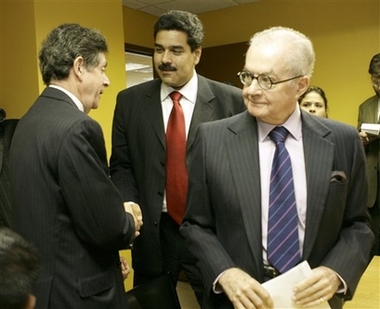 Guatemala and Venezuela have mutually agreed to drop their bids
Guatemala and Venezuela have mutually agreed to drop their bids for one of the temporary seats on the U.N. Security Council (UNSC) and will back
Panama as a compromise candidate. Neither one of the original candidates was able to gain a minimum of 2/3 majority from U.N. member states since voting began on October 16th. Though Bolivia and the Dominican Republic were nominated as possible compromise candidates last week, Ecuador’s foreign minister announced the deal after two rounds of talks on Wednesday between officials from both Venezuela and Guatemala. The deal hurts both and the U.S.; the former was keen on being an obstacle towards U.S. interests on the UNSC whereas the latter hand had picked Guatemala as its candidate four years ago.
Links- MSNBC (U.S.), BBC News, The Latin Americanist (blog), Xinhua (China), San Jose Mercury News Image- China Daily (Guatemalan and Venezuelan Foreign Ministers shake hands after reaching the deal)
Tags- Guatemala, Panama, United States, Venezuela, United Nations, international politics


Your back in fine form, Erwin C!
ReplyDeleteAs you might expect, I just have to pause on the word "hurt."
(1) Venezuela is not able to do what they were not able to do before the contest, (2) only now it will be Panama, whose president is not hostile to Chavez' Bolivarian notions, not lapdog Guatamala voting in the Security Council.
Not great, but not bad, especially when one considers that during the campaign Chavez made no effort to temper his language.
Panama, it can be said, is generally neutral towards both venezuelan and U.S. interests so it is a prime candidate for the UNSC. As a moderate who cannot stand either Bush or Chavez, I'm thrilled that neither the U.S. nor Venezuela won outright since the last thing the UN could afford (as if it didn't have enough problems as is) was a polarizing member on the UNSC.
ReplyDeleteI don't believe Chavez' harsh anti-U.S. rhetoric hurt more than helped since he was able to appeal himself to anti- U.S. elements in the world. Yet i think he accomplished more by offering oil and petrodollars in exchange for support on the U.N. surely this was similar to the U.S.' strategy of offering aid and who-knows-what-else in exchange for voting for Guatemala.